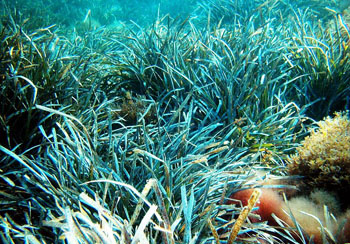
A new study on snorkelers in the Mediterranean sea finds a rare piece of good news about human impacts on the marine environment.
Joachim Clauedet and fellow researchers looked at snorkeling within the Cerbère Banyuls Natural Marine Reserve in the French Mediterranean and found that the activity had no observable effect on the structure of fish or macroalgae communities.
Managers of the protected area had constructed a self-guided underwater snorkeling trail within the buffer zone to try and concentrate any negative impacts in one area.
The researchers surveyed fish and macroalgae along the trail and a control site not subject to snorkeling. They found no differences in species richness or abundance of fish communities between the snorkeling trail or the control site.
Similarly they found no differences between sites in the cover of 3 macroalgae species chosen as indicators of potential human disturbance. They did find that fish and macroalgae communities changed over the course of the year, however, this occurred at both the snorkeling trail and the control site indicating that other factors were responsible.
The findings are somewhat surprising given the level of use that the underwater trail received. However, the results of the study need to be read with a little bit of caution.
Past studies have shown that trampling or swimming with fins can cause impacts to the branching growth forms of coral communities. However, in this particular reserve, similarly sensitive organisms do not occur along the snorkeling trail.
Nevertheless, the results are encouraging. The authors hypothesize that astute management of recreational use may be partly responsible for the positive outcome. They write,
"Impacts may have been avoided because [informative buoys] are settled where water is deep enough (bottoms deeper than 5 m). A device has been established to allow snorkelers to hang on the buoys while staying horizontally at the surface, to reduce fin damage… the absence of impact could also be due to the information provided to the snorkelers by the signs at the trail entrance or by the informative buoys distributed along the trail. Making users aware of the damage they can cause could be a serious option to reduce impacts in coastal areas with high frequentation."
--Reviewed by Rob Goldstein,
Conservation Maven
an online hub for the conservation community
Joachim Clauedet and fellow researchers looked at snorkeling within the Cerbère Banyuls Natural Marine Reserve in the French Mediterranean and found that the activity had no observable effect on the structure of fish or macroalgae communities.
Managers of the protected area had constructed a self-guided underwater snorkeling trail within the buffer zone to try and concentrate any negative impacts in one area.
The researchers surveyed fish and macroalgae along the trail and a control site not subject to snorkeling. They found no differences in species richness or abundance of fish communities between the snorkeling trail or the control site.
Similarly they found no differences between sites in the cover of 3 macroalgae species chosen as indicators of potential human disturbance. They did find that fish and macroalgae communities changed over the course of the year, however, this occurred at both the snorkeling trail and the control site indicating that other factors were responsible.
The findings are somewhat surprising given the level of use that the underwater trail received. However, the results of the study need to be read with a little bit of caution.
Past studies have shown that trampling or swimming with fins can cause impacts to the branching growth forms of coral communities. However, in this particular reserve, similarly sensitive organisms do not occur along the snorkeling trail.
Nevertheless, the results are encouraging. The authors hypothesize that astute management of recreational use may be partly responsible for the positive outcome. They write,
"Impacts may have been avoided because [informative buoys] are settled where water is deep enough (bottoms deeper than 5 m). A device has been established to allow snorkelers to hang on the buoys while staying horizontally at the surface, to reduce fin damage… the absence of impact could also be due to the information provided to the snorkelers by the signs at the trail entrance or by the informative buoys distributed along the trail. Making users aware of the damage they can cause could be a serious option to reduce impacts in coastal areas with high frequentation."
--Reviewed by Rob Goldstein,
Conservation Maven
an online hub for the conservation community
Ref. Claudet, J., Lenfant, P., & Schrimm, M. (2010). Snorkelers impact on fish communities and algae in a temperate marine protected area Biodiversity and Conservation DOI: 10.1007/s10531-010-9794-0
No comments:
Post a Comment